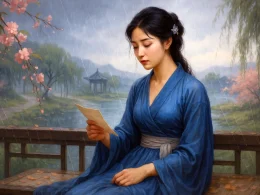Rugged is the road, I hear,
Built by the pioneer.
In front steep mountains rise;
Beside my horse cloud flies.
Over plank way trees hang down;
Spring water girds the town.
Decided our rise and fall.
Do not bother at all!
Original Poem
「送友人入蜀」
李白
见说蚕丛路,崎岖不易行。
山从人面起,云傍马头生。
芳树笼秦栈,春流绕蜀城。
升沉应已定,不必问君平。
Interpretation
This farewell poem by Tang dynasty poet Li Bai is dedicated to a friend embarking on a journey to Shu (modern Sichuan), renowned for its perilous mountain paths famously described as "more difficult than ascending to heaven." Through vivid depictions of Shu's landscapes and philosophical reflections, Li Bai expresses both concern for his friend's journey and profound meditations on life's vicissitudes. The poem combines scenic description with philosophical insight, showcasing Shu's magnificent scenery while conveying the poet's unique perspective on destiny, all rendered in Li Bai's characteristically fresh and elegant style.
First Couplet: "见说蚕丛路,崎岖不易行。"
Jiàn shuō cán cóng lù, qí qū bù yì xíng.
They say the Can Cong Road is rugged and hard to travel.
The opening establishes Shu's legendary difficulty, referencing the mythical Can Cong Road built by Shu's legendary founder Can Cong. The phrase "they say" lends an air of ancient lore, while "rugged and hard" directly conveys the journey's challenges, implicitly expressing concern for the traveler and setting the poem's tone.
Second Couplet: "山从人面起,云傍马头生。"
Shān cóng rén miàn qǐ, yún bàng mǎ tóu shēng.
Mountains rise sheer before one's face; clouds form beside the horse's head.
This couplet vividly captures Shu's precipitous landscapes. "Mountains rise sheer" creates dramatic verticality, while "clouds form beside the horse's head" depicts the enveloping mist with dynamic immediacy. The imagery makes the reader experience the journey's breathtaking danger firsthand.
Third Couplet: "芳树笼秦栈,春流绕蜀城。"
Fāng shù lǒng qín zhàn, chūn liú rào shǔ chéng.
Fragrant trees canopy the Qin plank roads; spring streams encircle Shu's cities.
Transitioning from danger to beauty, this couplet portrays Shu's lush scenery. "Fragrant trees canopy" suggests nature's protective embrace, while "spring streams encircle" depicts the land's vitality. The contrast between peril and beauty enriches the poem's texture.
Fourth Couplet: "升沉应已定,不必问君平。"
Shēng chén yīng yǐ dìng, bù bì wèn jūn píng.
Life's ups and downs are preordained - no need to consult Jun Ping.
The conclusion shifts to philosophy. Referencing Yan Junping, a famous Han dynasty fortune-teller, Li Bai advises acceptance of fate's predetermined course. This reflects both consolation for the traveler and the poet's own worldview, elevating the poem's significance.
Overall Appreciation
This poem masterfully interweaves landscape depiction with philosophical insight. Beginning with Shu's legendary difficulty, progressing through its dangerous yet beautiful scenery, and culminating in existential reflection, it exemplifies Li Bai's signature blend of bold imagery and profound thought. The concise yet vivid language creates striking visual impressions while conveying deep emotional resonance.
Literary Characteristics
- Scenic-Emotional Fusion: Landscapes embody both physical journey and emotional state
- Dynamic Imagery: Verbs like "rise," "form," "canopy" and "encircle" create vivid motion
- Historical Allusion: The Jun Ping reference adds cultural depth to the philosophical message
- Structural Contrast: Juxtaposition of danger and beauty enhances poetic tension
Insights
The poem suggests that while life's path may be as unpredictable as Shu's treacherous roads, acceptance brings peace. The recommendation against consulting oracles implies that true wisdom lies in embracing life's inherent uncertainties - a timeless message about navigating existence's inevitable challenges with grace and equanimity.
Poem translator:
Xu Yuan-chong(许渊冲)
About the poet

Li Bai (李白), 701 - 762 A.D., whose ancestral home was in Gansu, was preceded by Li Guang, a general of the Han Dynasty. Tang poetry is one of the brightest constellations in the history of Chinese literature, and one of the brightest stars is Li Bai.












